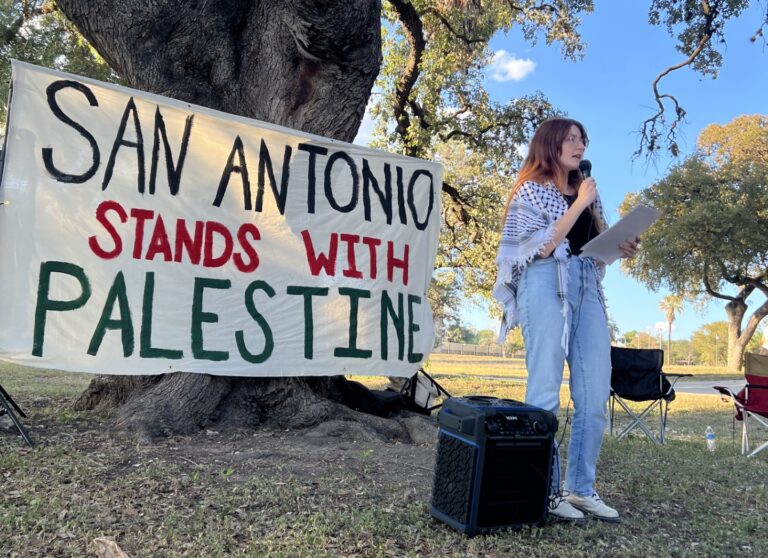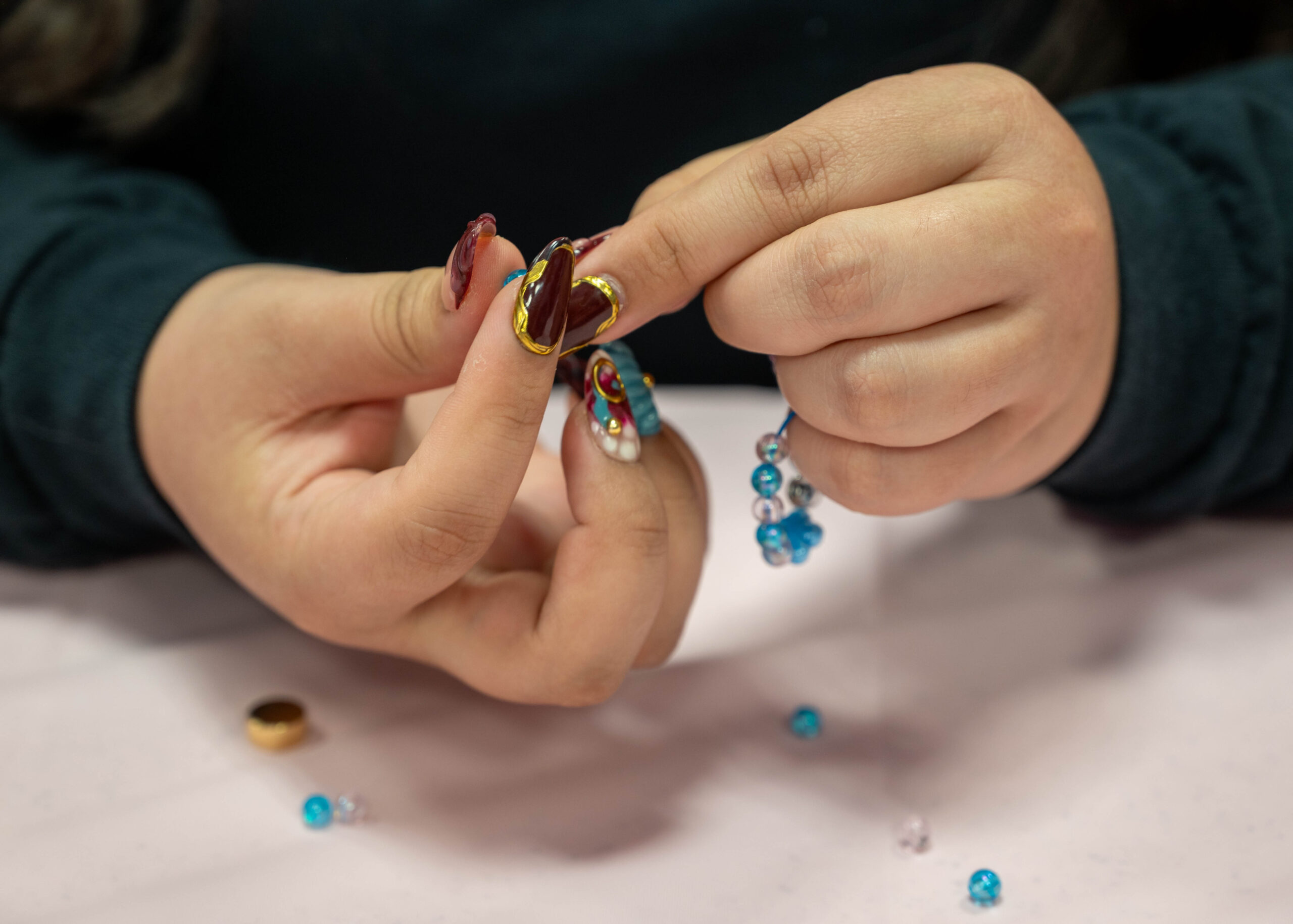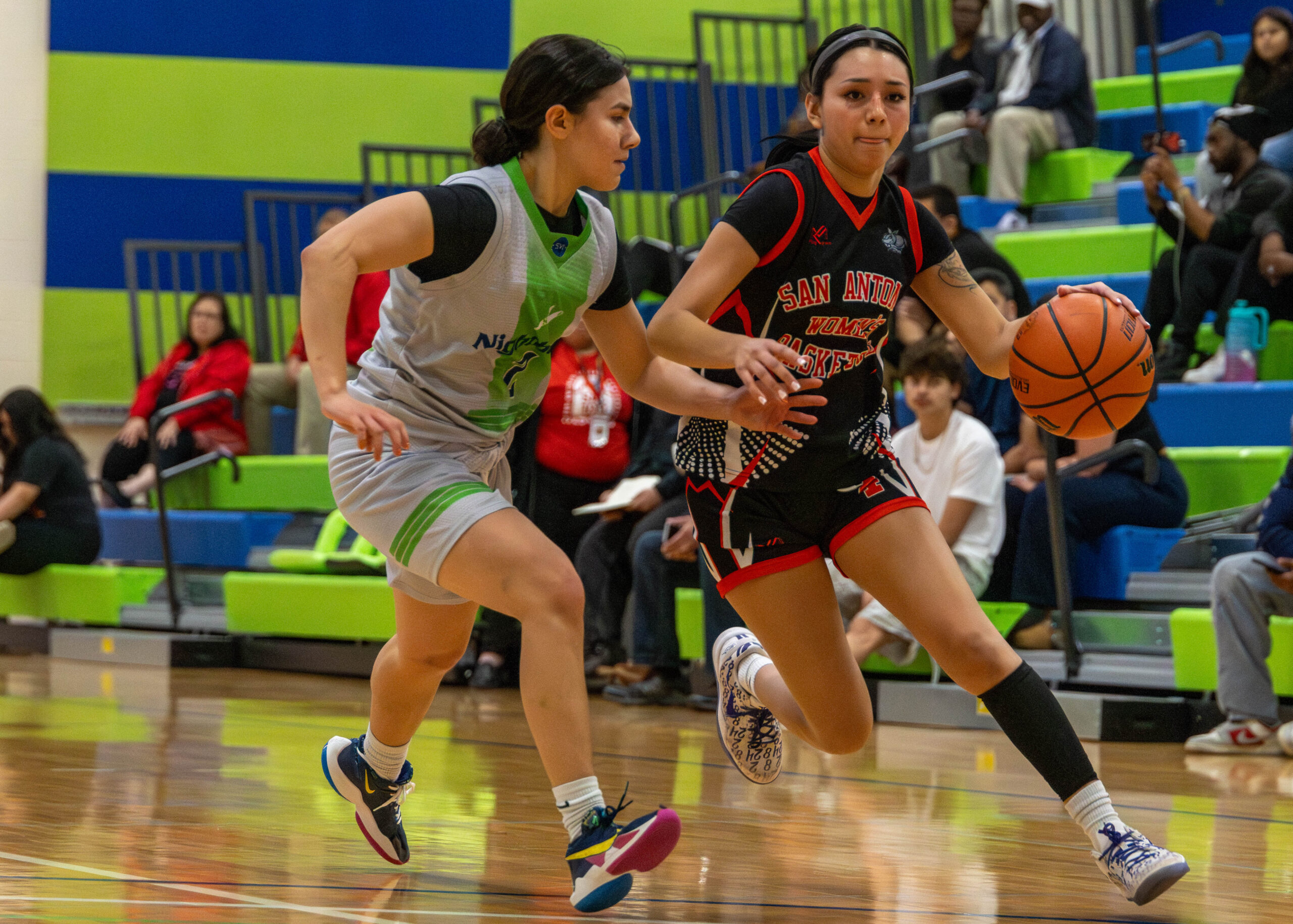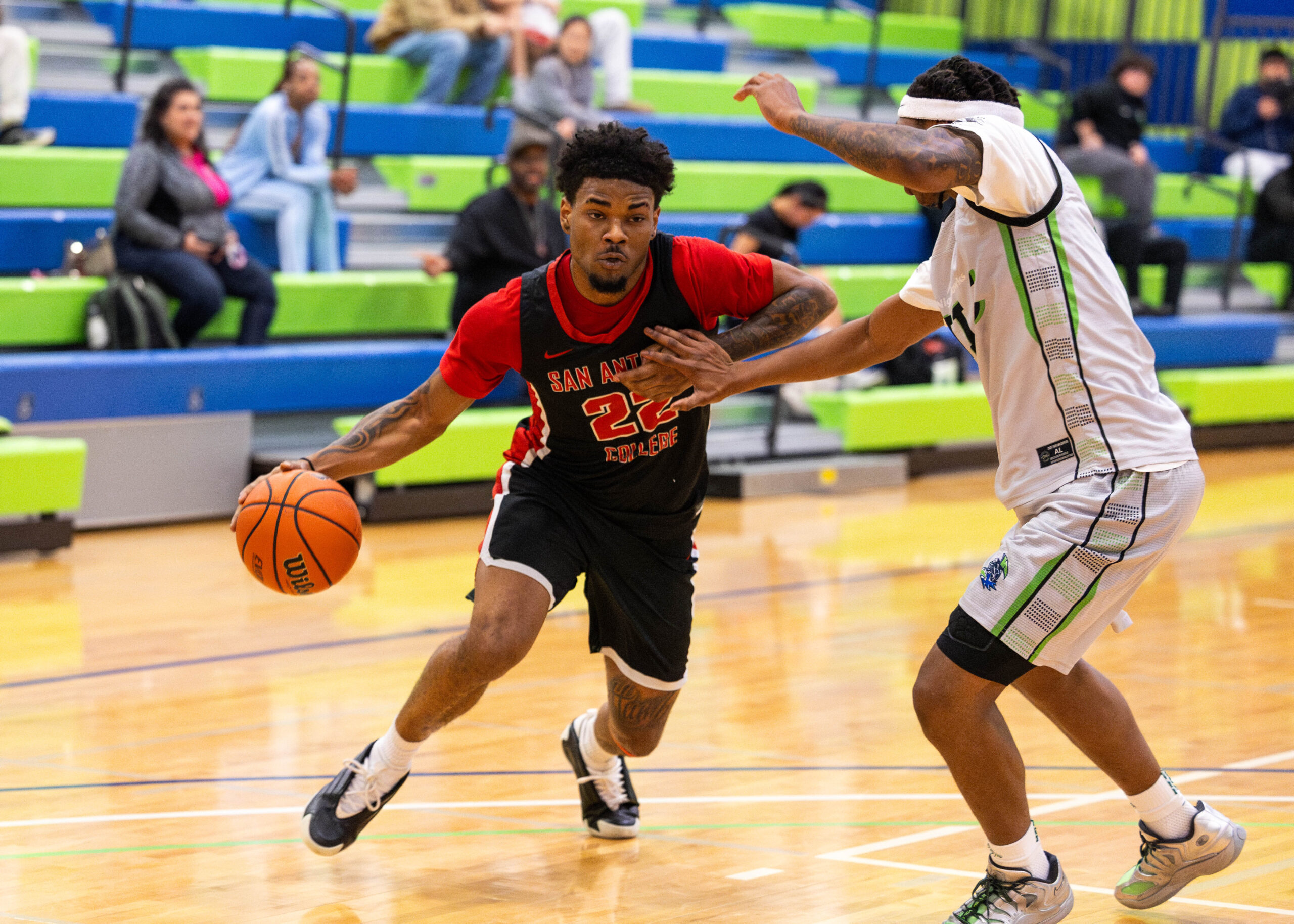“If I have to convince you to care about Palestine, my time is better used to other places,” English faculty Fatima Masoud said.
She spent her childhood moving with her parents from El Paso to the United Arab Emirates, experiencing life on borders.
“My dad is Palestinian, and my mom is Texan – American, White,” Masoud said. “When I was about four years old, we moved to the United Arab Emirates, where I spent most of my childhood. For five and a half years, we were in the United Arab Emirates, and we moved back to El Paso. I was homeschooled when we moved back, and then I left for high school, did my high school years in Amman, Jordan, and then came back to El Paso, and then moved to San Antonio as an adult … I think there’s so many moments that shaped my consciousness as a person, but moving around a lot is one of those.”
Masoud’s father was born in Kuwait, but her family are from Burqa, part of the northern West Bank of Palestine.
“I have tons of family in Palestine. Mostly because family, I used to joke that family trees in Palestinian families aren’t trees. They’re vines,” Masoud said. “I have my grandma and two of my aunts that live there (Burqa), and my aunts have their children, my cousins, who live there but then other than that, the rest of my family, which is huge, spread out over the United Arab Emirates, Kuwait, Bahrain, Qatar, all the Arab world, with a ton of family in El Paso.”
She remembers spending summers in Burqa as a child and staying in her family home built by her grandfather and father.
“American culture is ‘home is where the heart is,’ but in Palestinian culture, to have your home and to build it, especially in the occupied West Bank where so many of the Israeli laws don’t allow Palestinians to build their homes, it’s a big deal to build your own home,” Masoud said. “Not many Palestinians get to have that, and the idea with the homes is you build the home so that in the future, more levels can be built on top. And the idea was always that they would build on top and build on top because then multi-generational families live there.”
Tensions between Israelis and Palestinians have increased since the Hamas led attack Oct. 7, 2023. However, Masoud remembers life was not so easy before Israeli settlements were being built around Burqa.
“If you’re Palestinian with a Palestinian hawiya, which is the word for ID, like my dad has, you can only go in through one way, which is called the King Hussein Bridge, also known as the Allenby Bridge. And it borders Jordan to Palestine, but that bridge is controlled by Israelis,” Masoud said. “So, when you go in, it takes a long time. It’s really hectic. It’s uncomfortable, and then of course you could not be allowed in for whatever reason, depending on what the Israelis want that day.”
The border is segregated for Palestinians entering and exiting while tourists and residents of East Jerusalem have their own port, according to the Israel Airports Authority.
“I also have a political consciousness, so I’m aware. You see the soldiers at the checkpoint. You see the walls of the settlements. And I didn’t notice that when I was a kid. And the beautiful memories of olive trees and lemon groves and things like that were kind of clouded by this military presence.”
Masoud said the lack of opportunity and freedom for Palestinians is very apparent in everyday life.
Masoud said her cousin, Khaled, was shot and killed by Israeli forces in 2018 during a demonstration in Nablus. Khaled’s friend was also shot and wounded.
“They shot one of Khaled’s friends and shot Khaled in the heart,” Masoud said. “They’re shooting not to just disperse. They’re shooting to kill, and they probably would have killed his friend too if they had aimed a little higher.”
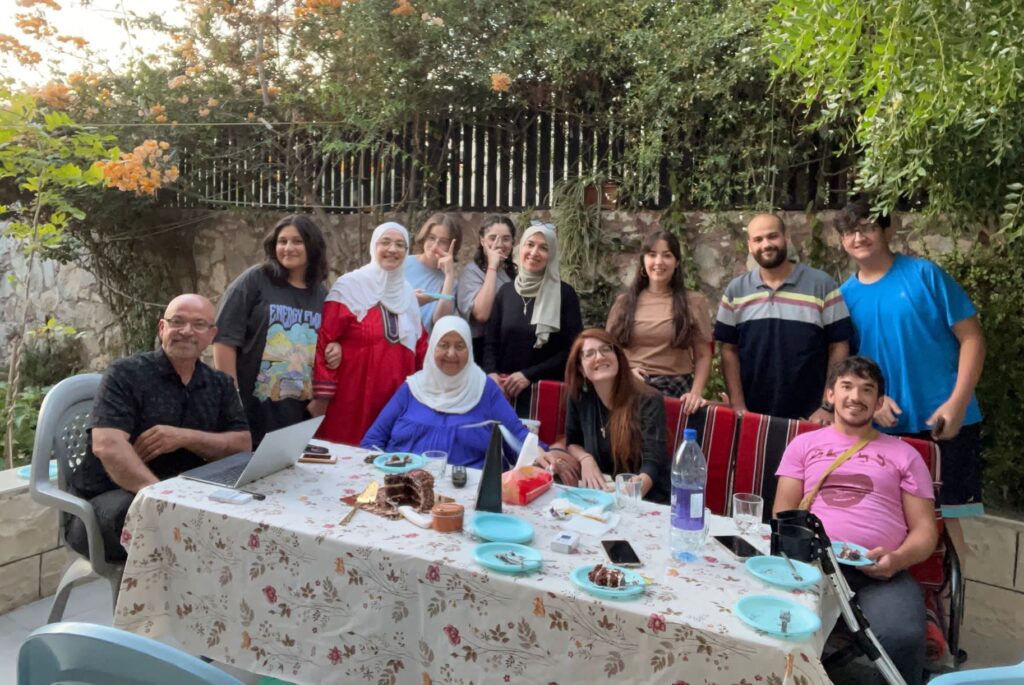
The Palestinian Health Ministry estimates that Israel’s ground and air campaign in Gaza — launched after the October 7 attack last year — has killed more than 41,500 people, with the majority of identified victims being women and children, according to Reuters.
“My cousins that are in school are 15 and 14. The Israeli army shot into my cousin’s classroom at a student and then shot his teacher in front of him,” Masoud said.
She had heard the news from her sister that the Israeli-Gaza border was breached on October 7, but her knowledge of history crept in.
“I was filled with this sense that Palestine will be free soon because that hadn’t happened in almost 20 years. And Gaza has been under siege since 2007, since Hamas was elected in 2006,” Masoud said. “Then, we started watching the bombings. I just remember the journalist from Al Jazeera, and then the bombing of the buildings behind her. Then my heart just sank. I was devastated because I knew in history, this would not be the first time that Gaza would be bombarded. I had no idea the level to which it would go because I was politically conscious in 2008, in 2012, in 2014, in 2018, in 2021, all of those dates where Gaza just got bombed beyond recognition. I never thought it would get this way.”
As the war has continued for a year, the death and destruction has captured the attention of the world and many locally.
“I never expected to hear about not one, but three different Americans self-immolating to stop it,” Masoud said. “I never expected rallies upon rallies, going to city hall every week just to ask the city to call for a ceasefire — the most minimal thing. I never thought that I would ever experience so much resistance.”
Masoud is part of San Antonio Justice in Palestine, a collective that has been operating for the last decade to bring more awareness to Palestine. They partner with educators, artists and volunteers to hold campaigns, film screenings, education sessions and general meetings.
“I was a part of the campaign to petition the city to call for a ceasefire back when many people were trying to petition different U.S. cities to call for a ceasefire,” Masoud said.
The call for a ceasefire included the immediate return of all hostages. However, Councilman Manny Palaez killed the resolution, stating it was causing more pain and anxiety than intended.
“So many other cities had the same issues where their city councils just would not come together and vote for a ceasefire, and so I view it as part and parcel of what’s happening collectively as a whole around the United States,” Masoud said. “People say the words, ‘We want this to end; we don’t support this.’ And at the same time, those words are coming out of their mouths, they’re signing away the arms deals with Israel. So those two things cannot live in the same world.”
Masoud said anyone can join SAJP and can help volunteer.
“It’s open to everyone in the community, and you don’t have to know everything to join the group,” Masoud said. “You just have to be liberation-minded, open to learning, and desire a free Palestine.”
While Masoud struggles with the war and the concerns of her family in Palestine, she understands the reality of it as the occupation and killing continue.
“If Palestine were a place to live, I would live there. I’d love to live in Palestine, but I can’t. I love the world that I’ve built here in this part of the world, but everybody wants to live in their own homelands,” Masoud said. ”I think also that part of the difficulty of when you’re Palestinian is there’s so much ‘It is what it is,’ and we have to be conscious and reckon with those histories.

